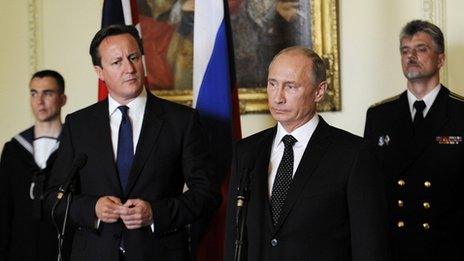Bitter Syria rift gets G8 off to tricky start
- Published
- comments

LOUGH ERNE, NORTHERN IRELAND: People from Downing Street are concerned that disagreements over Syria will overshadow this G8 summit, with its stated agenda of kindling new economic growth by tackling trade, taxes, and transparency.
But is it surprising that this should happen when UK Prime Minister David Cameron and Russian President Vladimir Putin let rip with a spectacular display of public differences on the issue on Sunday, while US President Barack Obama flew in hot on the heels of announcing that he will arm the opposition to Syria's President Bashar al-Assad.
The splits or rows perceived by journalists, particularly that breed driven desperate by the perverse mixture of isolation and spin imposed upon at them by the organisers of summits, are often feeble and concocted.
But when the leaders trade accusations about who has blood on their hands, or the eating of enemy livers, external, as happened in London on Sunday we can be quite sure that this is not invention.
This display of international disunity over Syria is all the more remarkable since less than two months have passed since the US Secretary of State John Kerry, and Russian Foreign Minister, Sergei Lavrov pledged to convene a peace conference, dubbed Geneva II, and to do it hopefully before the end of May.
Nobody is prepared to say publicly that the idea of a peace conference is dead, but one British foreign policy official told me a couple of weeks ago, "in truth the chance for a negotiated settlement was probably lost 18 months ago".
Even so, everyone with an interest in stopping the slaughter in Syria cannot begrudge the diplomats their attempts to make Geneva II happen. Two important things though have happened since that Kerry/Lavrov meeting.
The first was highly visible - the victory of Mr al-Assad's forces, aided by Lebanese Hezbollah fighters in the town of Qusair. It has convinced many of the ultras in Damascus that they are winning and that there is no need for serious peace talks, but it has also galvanised a fearsome reaction from the Sunni Umma or community, with declarations of Holy War and calls for volunteers.
While this has been going on something less visible, but no less important has also happened. The US, UK, and France have been trying to get a meaningful delegation together from the Syrian opposition to attend peace talks, and have failed.
Even the moderate National Coalition umbrella - the sort of people UK Foreign Secretary William Hague on Monday described as, "Syrians who want a democratic and peaceful future for their country" - has been rent with splits over whether to sit down with representatives of the Assad government to negotiate a transfer of power.
As for the militants of the Jabhat al-Nusra or the al-Qaeda affiliates who would need to go along with it any deal for it to stick, forget it.
The absence of a credible opposition leadership is not only a serious obstacle to a negotiated solution, but it is also a grim portent about what might happen in the country if the Assad regime imploded. Those who think the situation there is better compared to Somalia than Bosnia (a favourite in Downing Street discussions) feel that this vacuum bodes ill for the future.
With the chances for meaningful peacemaking so remote, both Russia and the US seem to have fallen back on realpolitik in their decisions to arm different sides. Moscow fears the establishment of a fundamentalist Sunni state, Washington a victory for Iran and its Hezbollah proxy.
Other voices at the G8 table, such as Germany and Japan, are all for upping humanitarian assistance but are strongly opposed to sending in weapons. With opinions so divided it is hardly surprising that the issue of Syria could get in the way of discussions about the world economy, but it is regrettable that the public airing of these differences should have given the summit such a bad start.